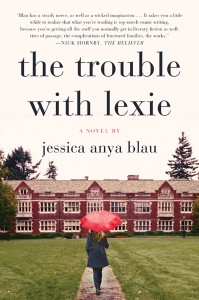In your earlier books, you drew a lot of the plot and characters from your own experiences growing up in 1970s Southern California. “The Wonder Bread Summer” (2013) moves away from the autobiographical, but incorporates details from your own life (most memorably to me, the clothing store owner/cocaine dealer who exposed himself to you in the dressing room). Is Lexie based on your life at all?
The story is fiction. I’ve never gotten myself as entangled in … well, I’ve never messed up as badly as Lexie does in the book (so far, knock on wood!). But I’ve certainly teetered close to the places she goes. And, I have a lot of girlfriends who have experienced versions of what Lexie goes through. But, who Lexie is inside—her panic and anxiety, her internal life—is really me. It’s my “voice” that comes out of her.
What are the advantages/disadvantages to using your own experiences in works of fiction?
I don’t know if there’s any advantage to using real life. My allegiance is always to the story—pacing, character, plot—and never to the truth, though I aim to keep everything emotionally true. I want to create characters who behave in ways that actual, living, breathing, flawed, humans do.
There are so many fantastic characters in Lexie—the Hershey’s Kiss-gobbling best friend, the neglectful mother, the suave private-school dad. Is there any character in particular that you enjoyed writing? Or that you found difficult to write?
I like them all—and I like going into each of their heads. I think this is why I like writing; I get to leave my body and “be” different people. It’s a great relief not to be oneself. And it’s interesting to imagine the internal life of people we think of as different from ourselves.
Do you have the plot mapped out at the beginning or are there elements you discover as you go?
I don’t know anything when I start. With this book, all I knew was the opening. She stole the drugs, she fell asleep on the bed of the owner of the drugs. But how she got there and what happens afterward were revealed to me as I moved along. I changed the ending many times. My instinct with endings is always wrong at first.
You are one of the hardest-working writers I know. Describe your writing routine.
I work anywhere under any circumstances. I had my ex-husband’s 8-year-old daughter staying with me recently. I love having her around, but I also had a deadline the next day, so I carried the pages with me and sat down and worked every chance I got.
You have some of the most memorable sex scenes I’ve read—the sandy fumblings from “Naked Swim Parties,” the Billy Idol tryst in “Wonder Bread” . . . And Lexie does not disappoint! Do you have any particular method for writing sex? Do you ever worry about how these scenes will be received?
The place I go with the sex is internal: what people are thinking, how they’re responding. Lexie has sex with three different people in this book. With one, she’s falling out of love, so the experience is shaped by her waning feelings. With another, she is falling in love, so the experience is heightened by that. And with the third, she’s too wasted to know what’s what. In every sex scene I write, I want to heighten plot/ tension and reveal character. You see who a person truly is by taking off her clothes and hearing her thoughts during sex.
“The Trouble with Lexie” (Harper Collins) hits bookstores in late June.






